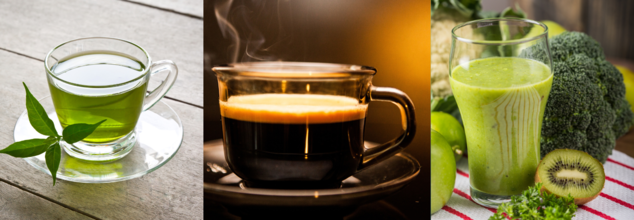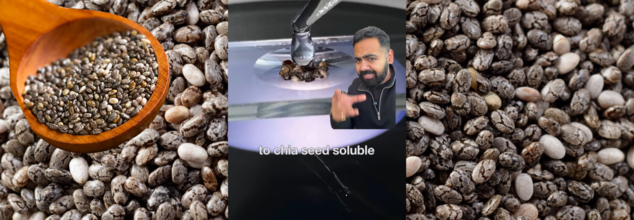- Health Conditions A-Z
- Health & Wellness
- Nutrition
- Fitness
- Health News
- Ayurveda
- Videos
- Medicine A-Z
- Parenting
- Web Stories
Three Powerful Drinks That Can Boost Your Gut Health, Shares Harvard Doc

Credits: Canva
It is important to keep you gut healthy, as your body's system is controlled by your gut, and no it is not just your digestion, but a lot other things. Including mental health. There are studies that show how stress can impact your gut health. In fact, studies have gone as far as indicating that Parkinson's Disease could begin in your gut. This is why it is extremely important to keep your gut healthy. That is why it is also known as body's "second brain". Other than that, liver too is important to keep your bodily functions on going. The liver plays an important role when it comes to detoxing the body by filtering toxins, metabolizing nutrients and also producing essential proteins.
This is why Harvard and Stanford expert based in California, a Gastroenterologist Dr Saurabh Sethi shared how these three beverages can keep your live and gut healthy. These are the drinks he also consumes on a daily basis and encourages others to do so!
In an Instagram video, he said, "As a gastroenterologist, I prioritize my gut and liver health every day." He also continues, "From nutrient-packed elixirs to simple, science-backed beverages, these drinks are easy to incorporate into your routine."
Here are the three drinks the doctor suggests:
Green Tea
It is not hidden that green tea has many benefits. It has high levels of catechins, which are powerful antioxidants. They also help reduce inflammation and protect cells from oxidative stress, which in return benefits your gut and liver.
This is why it is Sethi's first recommendation. Not just that, but there are studies which have shown that green tea has helped to alleviate the risk of cardiometabolic disease. It has the potential to minimize digestive issues like heartburn and bloating.
Coffee
Next up on Dr Sethi's list is coffee. Your morning coffee is not just good for your energy, but also for your liver. As per a 2016 study published in the Journal of Clinical and Experimental Hepatology, drinking 2 cups of coffee daily protects against the progression of almost all liver diseases.
What does the doctor say? Dr Sethi says, "coffee promotes liver health due to its antioxidant content." It is also helpful in decreasing the risk of fatty liver and liver cancer.
The key is to not add sugar to it!
However, anyone with heartburn or bloating must go for decaf coffee, which is prepared using the CO2 method to preserve its health benefits.
Smoothies
Smoothies are great. They are colorful and tasty! This is what makes it in his list too! The doctor talks about the nutritious smoothie one can craft by simply blending in types of vegetables, along with coconut water.
What makes it different from juices? Well, unlike juices, which may lose the fiber content due to processing, smoothies can actually retain the fiber and further help your gut health. It can also assist your digestive process.
Furthermore, when you mix it with coconut water, it can also form a refreshing base for your smoothie, and could aid with hydrating, especially as the harsh summer is about to hit. Additionally, coconut water also consists naturally occurring electrolytes, and it boosts its nutritional profile and makes it a healthier option over juices!
Can Your Coffee Habits Affect Your Lifespan?

Credits: Canva
Researchers from Tufts University analyzed health and dietary data from over 46,000 American adults collected between 1999 and 2018. They wanted to understand how different types of coffee — from black to heavily sweetened — might relate to overall mortality, including deaths from heart disease and cancer.
Their findings were revealing: people who drank at least one cup of caffeinated coffee daily had a 16% lower risk of dying prematurely from any cause. The sweet spot appeared to be two to three cups a day, which was linked to a 17% lower risk of early death. Interestingly, the study found no significant connection between coffee and cancer-related deaths.
The Role of Additives
So, what made the difference? According to the study, the key was how people took their coffee. Those who enjoyed their brew black or with just a little added sugar and saturated fat saw the most benefit. Once the coffee was loaded with sweeteners and rich creams, the protective effect faded.
To put it into perspective, “low” sugar was defined as about half a teaspoon per 8-ounce cup, and “low” fat meant around 1 gram of saturated fat — roughly the amount in five tablespoons of 2% milk or one tablespoon of light cream.
“Few studies have examined how coffee additives could impact the link between coffee consumption and mortality risk,” said lead author Bingjie Zhou, a recent Ph.D. graduate from Tufts. “Our study is among the first to quantify how much sweetener and saturated fat are being added.”
Decaf vs. Regular
While the study mostly focused on caffeinated coffee, it also looked at decaf. Fewer participants drank decaf regularly, making it harder to detect a clear pattern. As a result, no strong association was found between decaf coffee and reduced mortality risk.
A Word of Caution
It’s important to note that the study relied on self-reported food intake, which isn’t always precise. People may underreport how much sugar or cream they actually use, and other lifestyle factors might also play a role.
Still, the findings offer helpful guidance for coffee lovers. Senior author Fang Fang Zhang of Tufts University summed it up well: “Coffee is among the most-consumed beverages in the world… it’s important for us to know what it might mean for health.”
Your daily coffee habit could support a longer life — just keep it simple. Stick to black coffee or go easy on the sugar and cream. It turns out that when it comes to your morning brew, less really is more.
Doctor Shares Why Shouldn't You Eat Chia Seeds Dry

Credits: Canva and Instagram
Thanks to medical practitioners on social media who take it on them to spread awareness among people, we know a lot more things now than ever before. We are also way more medically sound. Among many such creators is Dr Karan Rajan, a UK-based surgeon, MRCS, MBBS, BSc, with 1.9m followers on his Instagram account @drkaranrajan. Recently he posted a video where one sees chia seeds under the microscope. While the images are nothing less than amazing, Dr Rajan reminds us why is it important to eat the seeds a certain way.
The video starts with chia seeds being shown under the microscope first without water, then with water. Both the times the images look quite different. The reason is, as Dr Rajan notes, chia seeds contain special nutrients which needs to be unlocked. This is because chia seeds are made of 85% of insoluble fiber and only about 15% of soluble fiber.
"It is the soluble fiber your gut bacteria love to ferment and feast on," he says. He also suggests that in order to optimize access to chia seed soluble fiber, you should hydrate it before eating."
He explains that hydrating chia seeds, by soaking them in water activates the chia's mucilage layer, which is a very potent soluble fiber. "In my opinion it is the most beneficial compound of the chia seeds," he says. The microscopic images too show the release of the layer once water has been poured on it.
What soaking does is, as Dr Rajan explains, it slows down digestion, leading to a stable blood sugar, it also prolongs satiety, which means it makes you feel fuller for a longer period of time. It also acts as a prebiotic, which then feed beneficial gut bacteria.
The soluble water also helps in drawing water into the colon to bulk up the stool and also helping in unlocking your "biological drain pipes".
What Happens If You Eat Chia Seeds Dry?
Dr Rajan says, "If you eat them dry, they will absorb water from your stomach and your intestines, they will still gel. [However], you might not get the full benefits because it depends how hydrated you are. So the prebiotic and laxative effects are less consistent."
"To get the full effect, soak the chia seeds, even if it is just for a few minutes. Make sure you are hydrated yourself well, and for optimal gel formation, use a ratio of chia seeds to water of 1:6. Or you can just blend them into smoothies, yogurts, and oatmeal so they can hydrate while they sit," he explains.
What Are Chia Seeds?
Chia seeds come from the Salvia hispanica plant, a flowering herb native to Mexico and Guatemala. A member of the mint family, this plant produces clusters of small blue-purple blooms where the tiny seeds are found. With their mild, slightly nutty taste, chia seeds blend easily into a variety of recipes without overpowering other flavors.
What truly sets chia seeds apart is their impressive ability to absorb liquid. “Chia seeds can soak up to 10 times their weight in water,” says Maya Brown, chef-instructor at the Auguste Escoffier School of Culinary Arts. This results in a unique gel-like texture that’s often used to thicken dishes or make puddings.
Nutritional Benefits
Chia seeds are among the richest plant-based sources of omega-3 fatty acids—healthy polyunsaturated fats that help lower blood pressure and cholesterol, both key contributors to heart disease. They also offer a boost of plant protein, gut-friendly fiber, and powerful antioxidants that help protect the body’s cells from damage and reduce disease risk.
Hooked On Sugar? The Addiction We Still Don’t Take Seriously

Sugar is sweet, comforting, and everywhere, but beneath its subtle appeal lies one of the most underestimated threats to our health. Across the globe, people consuming sugar in record amounts, often unknowingly. Yet, despite its impact on everything from our brains to our immune systems, sugar addiction is still not seen as a legitimate health concern.
With new research increasingly linking sugar to disease and neurological changes, one must wonder: Why are we not treating sugar like the dangerous addiction it is?
Human affinity for sweetness is not recent, our shared sweet tooth began 7th and 8th century Baghdad, where sherbets loaded with sugar and pastry entrees drizzled in syrup became common fare. Even the term "sugar" has an Arabic origin, in "sukkar," a dietary and linguistic heritage brought west by Crusaders.
What was once an occasional indulgence has become a daily expectation. In the US, over 60% of food and beverage items have added sugars, even those labeled as healthy, like yogurt, soups, or granola. A can of tomato soup has as much as 7 teaspoons of sugar, and Americans now eat approximately 17 teaspoons of added sugar every day.
Sugar Isn't Just a Food—It's a Fix
Let's be honest, sugar isn't just about flavor, it excites, it comforts, it distracts and it turns on the brain's dopamine-based reward system, providing us with a reliable shot of pleasure and tranquility under pressure or after a long workout. But repeated exposure gradually depresses this system with time, needing increasingly more to get the same response. This is referred to as dopamine downregulation—and it's the basis of addiction.
It doesn't work quite that way with alcohol or opioids, but rather hijacks the brain's dopamine system directly. It uses the reward system in a natural way through pleasurable flavor. That's why others think sugar overuse is actually more of a behavioral addiction, not a substance one.
How Does The Brain Work On Sugar?
Your brain uses glucose—a type of sugar, as its main source of fuel. It consumes almost half of all sugar-generated energy in your body. Brain activities such as thinking, memory, and learning all have a close relationship with blood glucose levels.
However, excessive sugar can upset this equilibrium. Long-term excess intake of fructose and glucose has been identified with accelerated cellular aging, diminished cognitive function, and decreased memory ability. In diabetes, high blood glucose levels damage the brain and contribute to neurodegeneration, setting the stage for diseases such as Alzheimer's.
Why We Crave Sugar Particularly When We're Under Stress?
Cravings are seldom about flavor. They are more typically emotional messages. Stress causes the release of cortisol, which raises blood sugar to aid the body in stress management. But persistent stress keeps the cycle going. The consequence? You need sugar because you're not as whole as your nervous system wants you to be.
Trauma, stress in early life, and unresolved anxiety can train the brain to search for hyper-palatable foods, particularly sugar as a way of coping. That's why so many people attempting to give up sugar fall off the wagon when they feel overwhelmed emotionally.
Beyond Weight How Sugar Affects The Body?
Whether or not sugar addiction qualifies clinically, its potential harm to human health is beyond argument. Consuming too much sugar (more than 6 teaspoons a day for women, 9 for men) has been linked to:
- Tooth decay and gum disease
- Fatigue and mood disorders
- Obesity and Type 2 diabetes
- Cardiovascular diseases
- Alzheimer's and other dementias
- Hormonal imbalance
- Chronic inflammation and autoimmune disease
Sugar fuels unhealthy gut bacteria, interferes with insulin sensitivity, and encourages advanced glycation end-products (AGEs), which destroy tissues and organs.
Can You Really Be Addicted to Sugar?
Scientists disagree. Some say sugar is addictive based on its impact on dopamine and the development of habits. Others think it's pleasure of flavor, not sugar levels, that drives obsessions.
Nevertheless, for most, the behavioral dynamics resemble addiction: cravings, binge sessions, withdrawal symptoms, and emotional dependence. Whether or not classified as addiction, extended overindulgence has definite effects on brain and body.
How To Break the Sweet Sugar Cycle?
Giving up sugar isn't only difficult—it's wired to be difficult but breaking free is as simple as resetting your body, not torturing it. Here's how:
1. Start with Blood Sugar Balance
Begin your day with protein-packed, fiber-filled, and healthy fat-rich meals. The combination of these three stabilizes mood, suppresses cravings, and controls insulin. Avocado on toast with eggs or a protein shake with berries and hemp seeds can be magic.
2. Reprogram the Brain with Nutrient-Rich Foods
Cruciferous vegetables, berries, citrus fruits, and magnesium- and B vitamin-rich foods assist in maintaining brain health and suppressing inflammation. These foods feed your nervous system and start soothing the biochemical mayhem sugar has unleashed.
3. Practice Intermittent Fasting Mindfully
If your body is prepared, gentle intermittent fasting can boost metabolic flexibility and trigger autophagy, a cellular detox cleanup mechanism that helps heal inflammation. But do not fast in a state of high stress or nutrient deficiency.
4. Train Your Taste Buds
After one week without refined sugar, your sweet sensitivity changes. Natural foods start tasting sweeter, and once-beloved junk food tastes suddenly artificial or overwhelming.
5. Sustain with Natural Sweeteners—In Moderation
Use small quantities of honey, maple syrup, coconut sugar, or dates if necessary. Unlike sugars that have been refined, they contain trace nutrients and fiber—but use them sparingly.
6. Include Critical Micronutrients
Magnesium, chromium, and B vitamins (particularly B1 and P5P) regulate blood sugar and even mood. Wise supplementation can make a tremendous impact on curbing cravings.
Healing from sugar addiction isn't so much about the food—it's about what the food was doing instead. Most of us turn to sugar in order to soothe, distract, or experience fleeting happiness. In order to really heal, we must create alternative routes for emotional management and pleasure. This could look like:
- Daily movement or gentle exercise
- Mindfulness or breathing exercises
- Spending time in nature
- Creative expression through music, writing, or art
- Nourishing social connection
With time, these habits calm the nervous system, make insulin more sensitive, and regulate energy levels—breaking the biological cycle that perpetuates sugar addiction.
Sugar is the one we don't discuss enough because it's hidden in plain sight. But its impact on our biology, behavior, and health is significant. Being unhooked from sugar is to get off the rollercoaster of highs and lows, and take back stable, vital health.
© 2024 Bennett, Coleman & Company Limited

